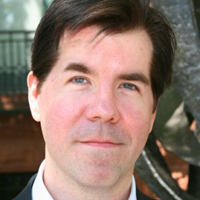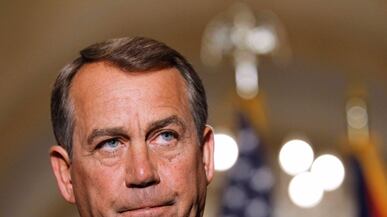As if the good people of Detroit did not have enough troubles, Hollywood had to throw Charlie Sheen at them. Riding a wave of delusion, Sheen apparently believed that he could do any random, crazy thing at his debut concert in the Motor City and "his people" would love him for it. He was wrong. Detroiters heckled the falling star, and then walked out en masse. All of which, naturally, got me to thinking about John Boehner. The speaker of the House also appears to be just one precarious misstep away from a mass walkout by his fickle, easily frustrated supporters. Unlike the clueless Sheen, however, Speaker Boehner appears to know it.
Whatever he does, the speaker is going to disappoint somebody—and the consequences, for the party’s future and his own, may well prove disastrous, particularly for him.

It is hardly a secret that a number of Republican House freshmen, cocksure after their historic triumph last November, would have loved to unseat Boehner from his leadership position. Not for anything he’d done, really. He simply had been in Congress too long, a walking, talking manifestation of the discredited GOP establishment. And it didn't help matters that Boehner even looked like a modern-day Boss Tweed—overly tanned, carefully coiffed with a backslapping, cigar-chopping manner. But lacking a clear casus belli, reform-minded Republicans seemed stuck with Boehner, until what most assumed would be his inevitable collapse.
That collapse has not come. Boehner has proven more skillful than his skeptics expected, deft at managing the expectations of an ambitious, eager-to-cut-government freshman class and the go-it-slow, let’s-focus-on-reelection sentiments of the old party bulls. The incoming speaker helped propel promising freshman into positions of power in Congress, as chairman of important subcommittees, earning their gratitude and, at least for now, their loyalty. Boehner also won the unaninimous support of the GOP conference for a ban on earmarks—a first for his party and an adroit effort to appeal to voters who equate earmarks with Washington corruption.
Most tellingly, Boehner has avoided the trap set that ensnared his predecessor, former Speaker Newt Gingrich, by maintaining a determinedly low profile in the media. Everyone in America knew who Newt was after the Republican’s 1994 electoral tsunami. Yet to this day, less than half of all voters have any idea who John Boehner is. This is good news for the leader; it has made it harder for the Democrats to turn him into this year’s Ebenezer Scrooge, eager to destroy Social Security and steal Grandma’s health care. It looks increasingly unlikely that voters will find Boehner in the midst of personal scandals, gaffes, or public battles with the president over their egos that detract from the GOP agenda. The Boehner watchword upon his election as speaker was unusual for Washington: “Humble.”
• John Avlon: How a Gov’t Shutdown Screws Paul Ryan• Patricia Murphy: The Tea Party’s Budget Freakout • Daniel Stone: The Capitol Hill Shutdown Slumber Party • Government Shutdown: Full coverageAnd yet despite the promising start, the speaker's long-term job security remains shakier than Muammar Gaddafi's. However it is resolved, the battle under way over this year’s budget may yet be the speaker's undoing. Boehner is keenly aware of that and, like a master acrobat on a slippery trapeze, he has shifted his position moment to moment to stave off disaster. Early on in negotiations with the White House, for example, Boehner's office seemed to signal that the speaker would be on board for spending cuts the president recommended to the tune of $30 billion—itself a pittance considering the size of the federal budget. In a normal year, Boehner and the Republicans would have cut a deal, declared victory, proclaimed themselves great budget-cutters in the media, and then waited a few weeks before spending even more money. Not this time. Not so far.
Sensing a revolt from his conservative colleagues—who seek to double the spending cuts for this year— Boehner reversed course, saying that he had never agreed to any specific figure with the president. He has also signed on to tough spending reductions advocated by House Budget Chairman Paul Ryan (R-WI), which even Ryan himself acknowledged might leave his party open to political attack. Seizing on Boehner's zigzags, Senators Harry Reid (D-NV) and Chuck Schumer (D-NY) led the Democrats in accusing the speaker of being afraid of the “extremists” in the Tea Party.
This, of course, is true. But if you were John Boehner, wouldn’t you be? A large contingent of GOPers in the House understands the dangers posed to their own political survival by seeming to back down on their promises to get serious about runaway federal spending. Few would hesitate to throw their speaker aside if his knees appear to wobble.
With a government shutdown looming, Boehner now faces a choice that will demonstrate whether in fact he is the GOP's Houdini. He now stands between satisfying large numbers of his party who want him to cut a deal and save the party from what they are certain will be a PR debacle and an aggressive but likely smaller faction of the GOP who want the speaker to fight for deeper cuts, this year and then next year, shutdown or no. Whatever he does, the speaker is going to disappoint somebody—and the consequences, for the party’s future and his own, may well prove disastrous, particularly for him. As Sheen has learned, no performer is indispensable.
Matt Latimer is the author of The New York Times bestseller Speech-less: Tales of a White House Survivor. He was deputy director of speechwriting for George W. Bush and chief speechwriter for Donald Rumsfeld.






